The Interplay of Line Managers and HR in Talent Management
VerifiedAdded on 2022/09/08
|7
|2216
|66
Report
AI Summary
This report delves into the crucial intersection of line managers and Human Resources within the realm of talent management. It begins by defining the roles of line managers, emphasizing their responsibilities in directing employees, setting targets, and making decisions, while highlighting their importance in recruitment, training, performance evaluation, and fostering employee engagement. The report then transitions to define talent management, emphasizing its integrated processes aimed at attracting, developing, and retaining talent to meet organizational objectives. It explores strategic approaches such as job descriptions, development opportunities, performance assessments, selection processes, and compensation strategies. The report further analyzes the challenges faced in designing and implementing talent management, including demands for higher compensation, company culture issues, employee turnover, and lack of leadership, and suggests strategies to overcome these obstacles. The report concludes by summarizing the significance of line managers and HR in organizational success, stressing the need for effective guidance, training, and support to navigate the complexities of talent management, with examples from companies like Coca-Cola and TCS.
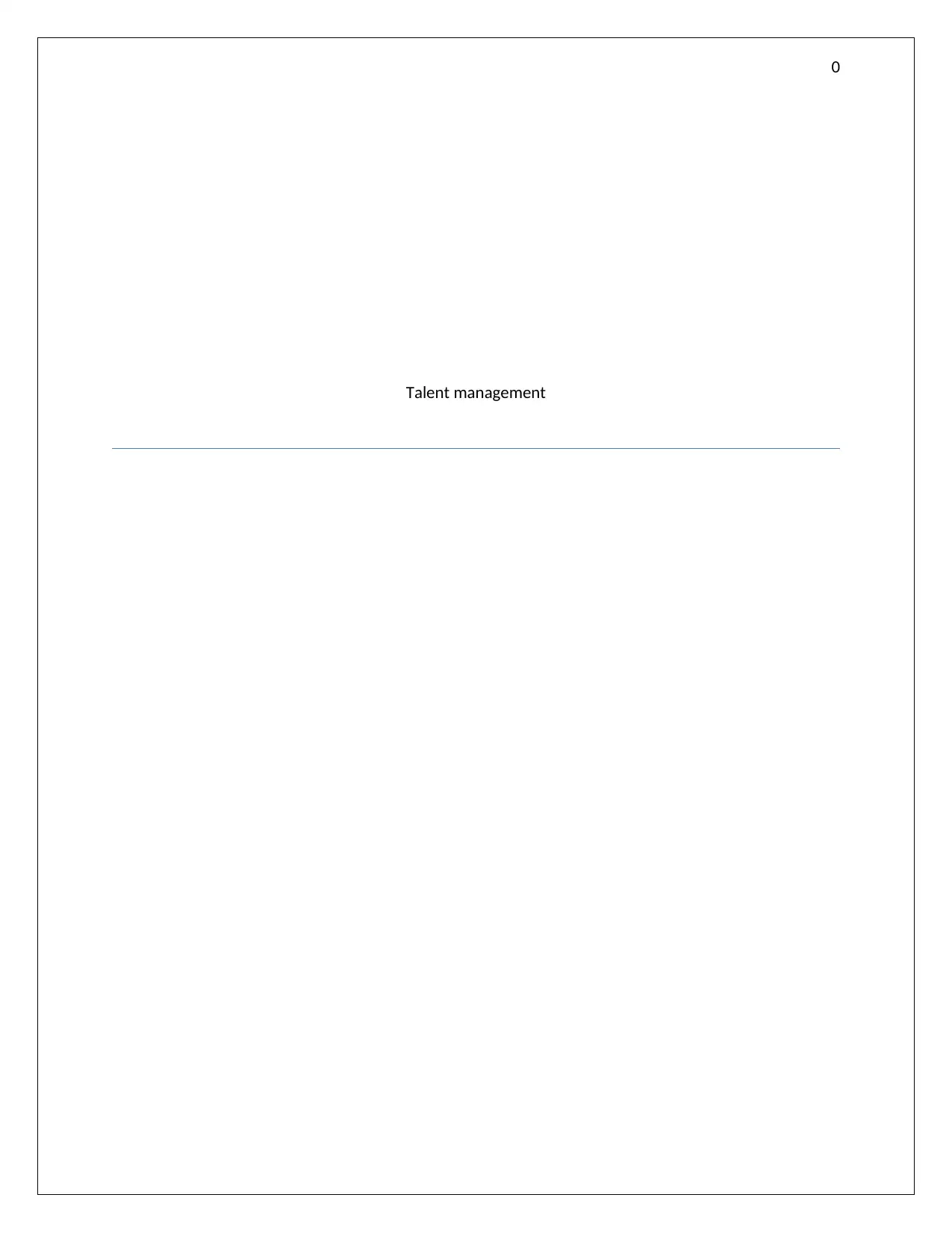
0
Talent management
Talent management
Paraphrase This Document
Need a fresh take? Get an instant paraphrase of this document with our AI Paraphraser
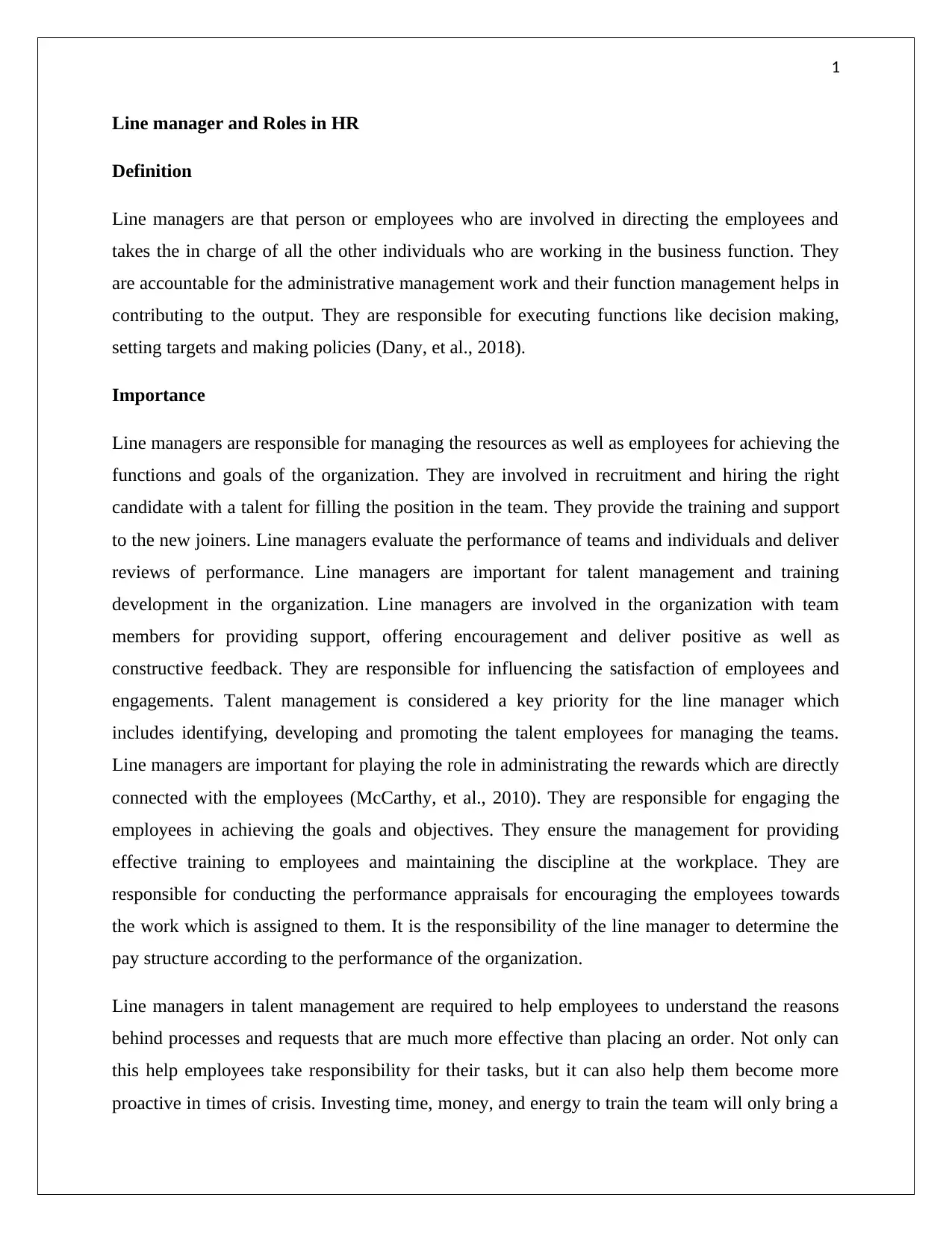
1
Line manager and Roles in HR
Definition
Line managers are that person or employees who are involved in directing the employees and
takes the in charge of all the other individuals who are working in the business function. They
are accountable for the administrative management work and their function management helps in
contributing to the output. They are responsible for executing functions like decision making,
setting targets and making policies (Dany, et al., 2018).
Importance
Line managers are responsible for managing the resources as well as employees for achieving the
functions and goals of the organization. They are involved in recruitment and hiring the right
candidate with a talent for filling the position in the team. They provide the training and support
to the new joiners. Line managers evaluate the performance of teams and individuals and deliver
reviews of performance. Line managers are important for talent management and training
development in the organization. Line managers are involved in the organization with team
members for providing support, offering encouragement and deliver positive as well as
constructive feedback. They are responsible for influencing the satisfaction of employees and
engagements. Talent management is considered a key priority for the line manager which
includes identifying, developing and promoting the talent employees for managing the teams.
Line managers are important for playing the role in administrating the rewards which are directly
connected with the employees (McCarthy, et al., 2010). They are responsible for engaging the
employees in achieving the goals and objectives. They ensure the management for providing
effective training to employees and maintaining the discipline at the workplace. They are
responsible for conducting the performance appraisals for encouraging the employees towards
the work which is assigned to them. It is the responsibility of the line manager to determine the
pay structure according to the performance of the organization.
Line managers in talent management are required to help employees to understand the reasons
behind processes and requests that are much more effective than placing an order. Not only can
this help employees take responsibility for their tasks, but it can also help them become more
proactive in times of crisis. Investing time, money, and energy to train the team will only bring a
Line manager and Roles in HR
Definition
Line managers are that person or employees who are involved in directing the employees and
takes the in charge of all the other individuals who are working in the business function. They
are accountable for the administrative management work and their function management helps in
contributing to the output. They are responsible for executing functions like decision making,
setting targets and making policies (Dany, et al., 2018).
Importance
Line managers are responsible for managing the resources as well as employees for achieving the
functions and goals of the organization. They are involved in recruitment and hiring the right
candidate with a talent for filling the position in the team. They provide the training and support
to the new joiners. Line managers evaluate the performance of teams and individuals and deliver
reviews of performance. Line managers are important for talent management and training
development in the organization. Line managers are involved in the organization with team
members for providing support, offering encouragement and deliver positive as well as
constructive feedback. They are responsible for influencing the satisfaction of employees and
engagements. Talent management is considered a key priority for the line manager which
includes identifying, developing and promoting the talent employees for managing the teams.
Line managers are important for playing the role in administrating the rewards which are directly
connected with the employees (McCarthy, et al., 2010). They are responsible for engaging the
employees in achieving the goals and objectives. They ensure the management for providing
effective training to employees and maintaining the discipline at the workplace. They are
responsible for conducting the performance appraisals for encouraging the employees towards
the work which is assigned to them. It is the responsibility of the line manager to determine the
pay structure according to the performance of the organization.
Line managers in talent management are required to help employees to understand the reasons
behind processes and requests that are much more effective than placing an order. Not only can
this help employees take responsibility for their tasks, but it can also help them become more
proactive in times of crisis. Investing time, money, and energy to train the team will only bring a
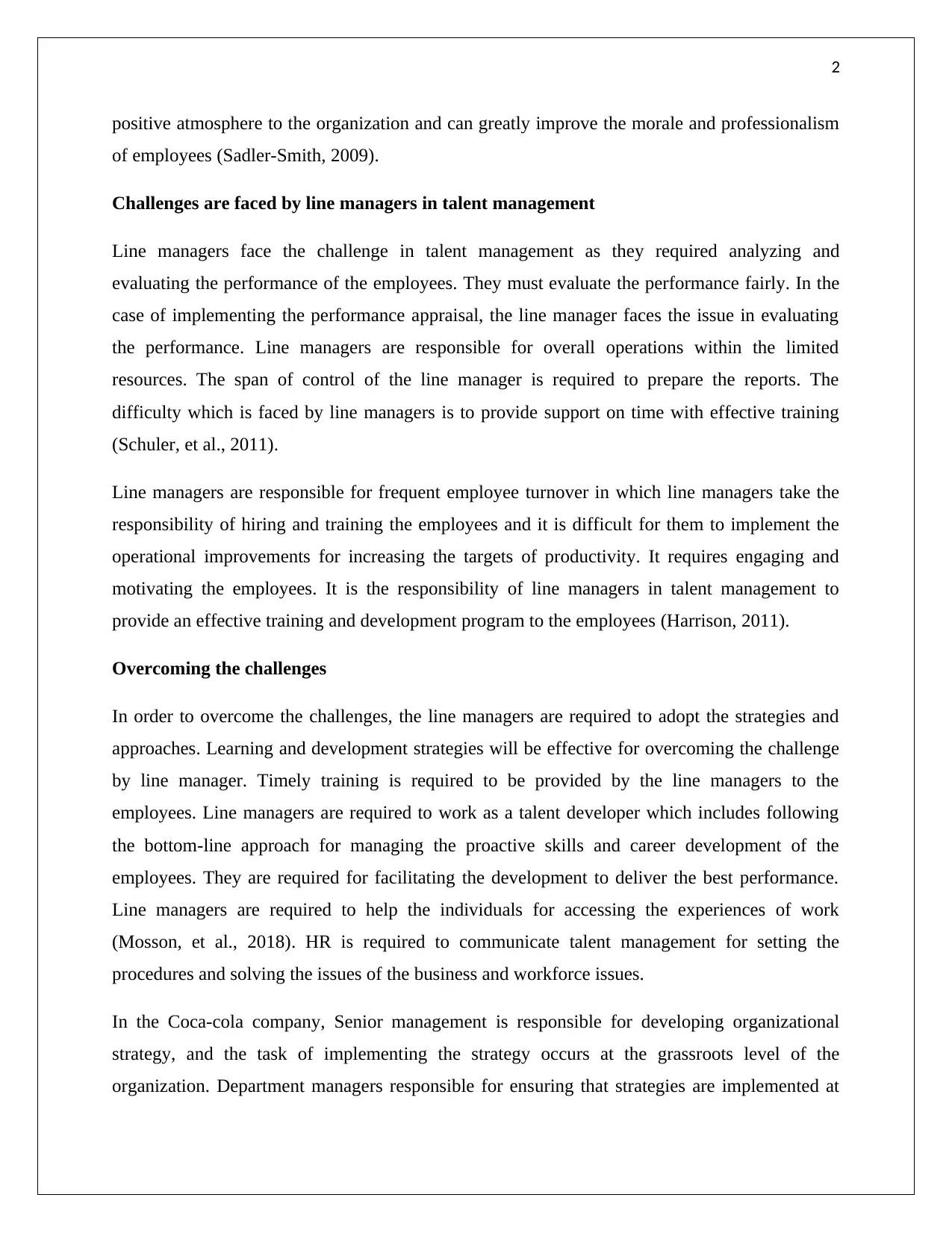
2
positive atmosphere to the organization and can greatly improve the morale and professionalism
of employees (Sadler-Smith, 2009).
Challenges are faced by line managers in talent management
Line managers face the challenge in talent management as they required analyzing and
evaluating the performance of the employees. They must evaluate the performance fairly. In the
case of implementing the performance appraisal, the line manager faces the issue in evaluating
the performance. Line managers are responsible for overall operations within the limited
resources. The span of control of the line manager is required to prepare the reports. The
difficulty which is faced by line managers is to provide support on time with effective training
(Schuler, et al., 2011).
Line managers are responsible for frequent employee turnover in which line managers take the
responsibility of hiring and training the employees and it is difficult for them to implement the
operational improvements for increasing the targets of productivity. It requires engaging and
motivating the employees. It is the responsibility of line managers in talent management to
provide an effective training and development program to the employees (Harrison, 2011).
Overcoming the challenges
In order to overcome the challenges, the line managers are required to adopt the strategies and
approaches. Learning and development strategies will be effective for overcoming the challenge
by line manager. Timely training is required to be provided by the line managers to the
employees. Line managers are required to work as a talent developer which includes following
the bottom-line approach for managing the proactive skills and career development of the
employees. They are required for facilitating the development to deliver the best performance.
Line managers are required to help the individuals for accessing the experiences of work
(Mosson, et al., 2018). HR is required to communicate talent management for setting the
procedures and solving the issues of the business and workforce issues.
In the Coca-cola company, Senior management is responsible for developing organizational
strategy, and the task of implementing the strategy occurs at the grassroots level of the
organization. Department managers responsible for ensuring that strategies are implemented at
positive atmosphere to the organization and can greatly improve the morale and professionalism
of employees (Sadler-Smith, 2009).
Challenges are faced by line managers in talent management
Line managers face the challenge in talent management as they required analyzing and
evaluating the performance of the employees. They must evaluate the performance fairly. In the
case of implementing the performance appraisal, the line manager faces the issue in evaluating
the performance. Line managers are responsible for overall operations within the limited
resources. The span of control of the line manager is required to prepare the reports. The
difficulty which is faced by line managers is to provide support on time with effective training
(Schuler, et al., 2011).
Line managers are responsible for frequent employee turnover in which line managers take the
responsibility of hiring and training the employees and it is difficult for them to implement the
operational improvements for increasing the targets of productivity. It requires engaging and
motivating the employees. It is the responsibility of line managers in talent management to
provide an effective training and development program to the employees (Harrison, 2011).
Overcoming the challenges
In order to overcome the challenges, the line managers are required to adopt the strategies and
approaches. Learning and development strategies will be effective for overcoming the challenge
by line manager. Timely training is required to be provided by the line managers to the
employees. Line managers are required to work as a talent developer which includes following
the bottom-line approach for managing the proactive skills and career development of the
employees. They are required for facilitating the development to deliver the best performance.
Line managers are required to help the individuals for accessing the experiences of work
(Mosson, et al., 2018). HR is required to communicate talent management for setting the
procedures and solving the issues of the business and workforce issues.
In the Coca-cola company, Senior management is responsible for developing organizational
strategy, and the task of implementing the strategy occurs at the grassroots level of the
organization. Department managers responsible for ensuring that strategies are implemented at
⊘ This is a preview!⊘
Do you want full access?
Subscribe today to unlock all pages.

Trusted by 1+ million students worldwide
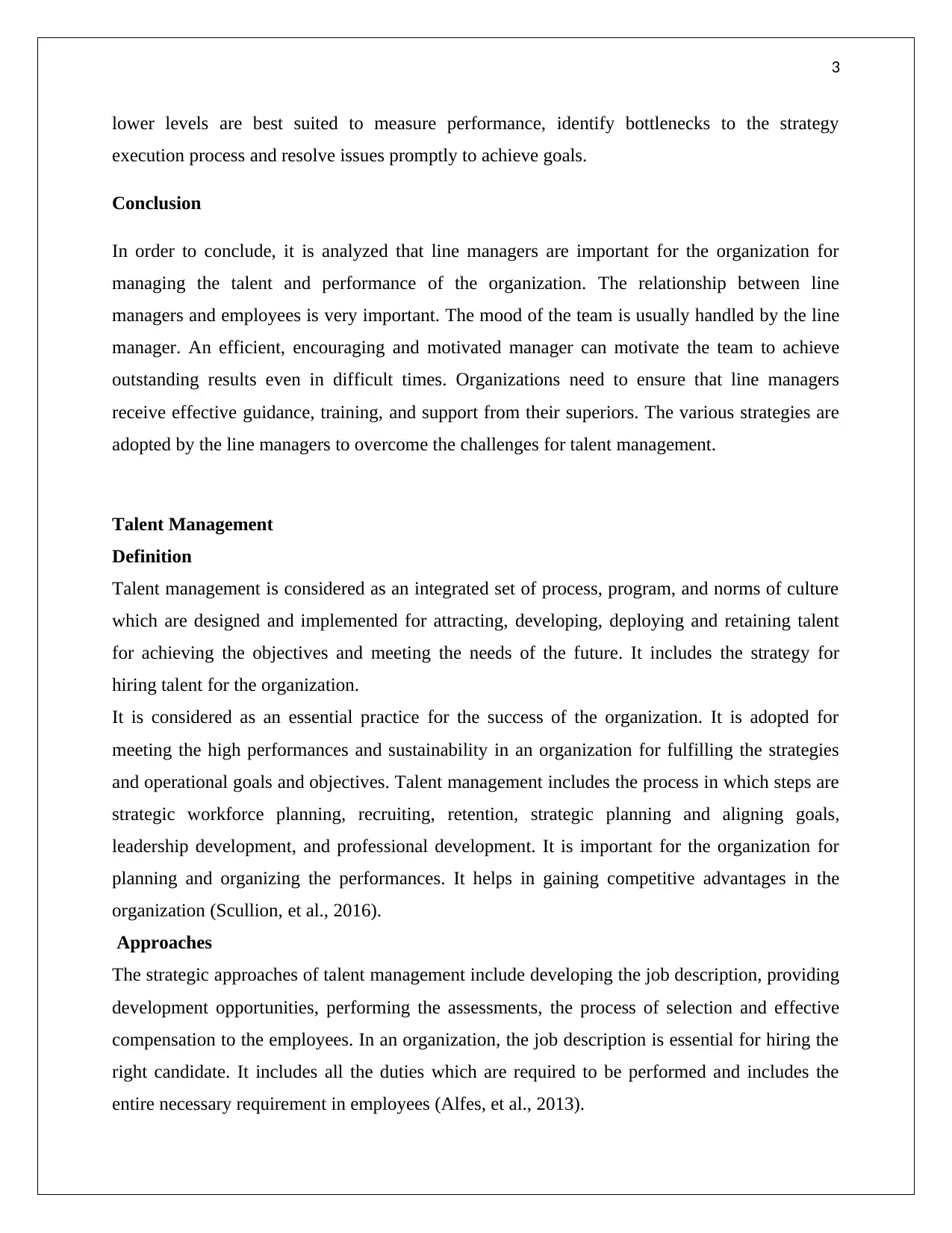
3
lower levels are best suited to measure performance, identify bottlenecks to the strategy
execution process and resolve issues promptly to achieve goals.
Conclusion
In order to conclude, it is analyzed that line managers are important for the organization for
managing the talent and performance of the organization. The relationship between line
managers and employees is very important. The mood of the team is usually handled by the line
manager. An efficient, encouraging and motivated manager can motivate the team to achieve
outstanding results even in difficult times. Organizations need to ensure that line managers
receive effective guidance, training, and support from their superiors. The various strategies are
adopted by the line managers to overcome the challenges for talent management.
Talent Management
Definition
Talent management is considered as an integrated set of process, program, and norms of culture
which are designed and implemented for attracting, developing, deploying and retaining talent
for achieving the objectives and meeting the needs of the future. It includes the strategy for
hiring talent for the organization.
It is considered as an essential practice for the success of the organization. It is adopted for
meeting the high performances and sustainability in an organization for fulfilling the strategies
and operational goals and objectives. Talent management includes the process in which steps are
strategic workforce planning, recruiting, retention, strategic planning and aligning goals,
leadership development, and professional development. It is important for the organization for
planning and organizing the performances. It helps in gaining competitive advantages in the
organization (Scullion, et al., 2016).
Approaches
The strategic approaches of talent management include developing the job description, providing
development opportunities, performing the assessments, the process of selection and effective
compensation to the employees. In an organization, the job description is essential for hiring the
right candidate. It includes all the duties which are required to be performed and includes the
entire necessary requirement in employees (Alfes, et al., 2013).
lower levels are best suited to measure performance, identify bottlenecks to the strategy
execution process and resolve issues promptly to achieve goals.
Conclusion
In order to conclude, it is analyzed that line managers are important for the organization for
managing the talent and performance of the organization. The relationship between line
managers and employees is very important. The mood of the team is usually handled by the line
manager. An efficient, encouraging and motivated manager can motivate the team to achieve
outstanding results even in difficult times. Organizations need to ensure that line managers
receive effective guidance, training, and support from their superiors. The various strategies are
adopted by the line managers to overcome the challenges for talent management.
Talent Management
Definition
Talent management is considered as an integrated set of process, program, and norms of culture
which are designed and implemented for attracting, developing, deploying and retaining talent
for achieving the objectives and meeting the needs of the future. It includes the strategy for
hiring talent for the organization.
It is considered as an essential practice for the success of the organization. It is adopted for
meeting the high performances and sustainability in an organization for fulfilling the strategies
and operational goals and objectives. Talent management includes the process in which steps are
strategic workforce planning, recruiting, retention, strategic planning and aligning goals,
leadership development, and professional development. It is important for the organization for
planning and organizing the performances. It helps in gaining competitive advantages in the
organization (Scullion, et al., 2016).
Approaches
The strategic approaches of talent management include developing the job description, providing
development opportunities, performing the assessments, the process of selection and effective
compensation to the employees. In an organization, the job description is essential for hiring the
right candidate. It includes all the duties which are required to be performed and includes the
entire necessary requirement in employees (Alfes, et al., 2013).
Paraphrase This Document
Need a fresh take? Get an instant paraphrase of this document with our AI Paraphraser
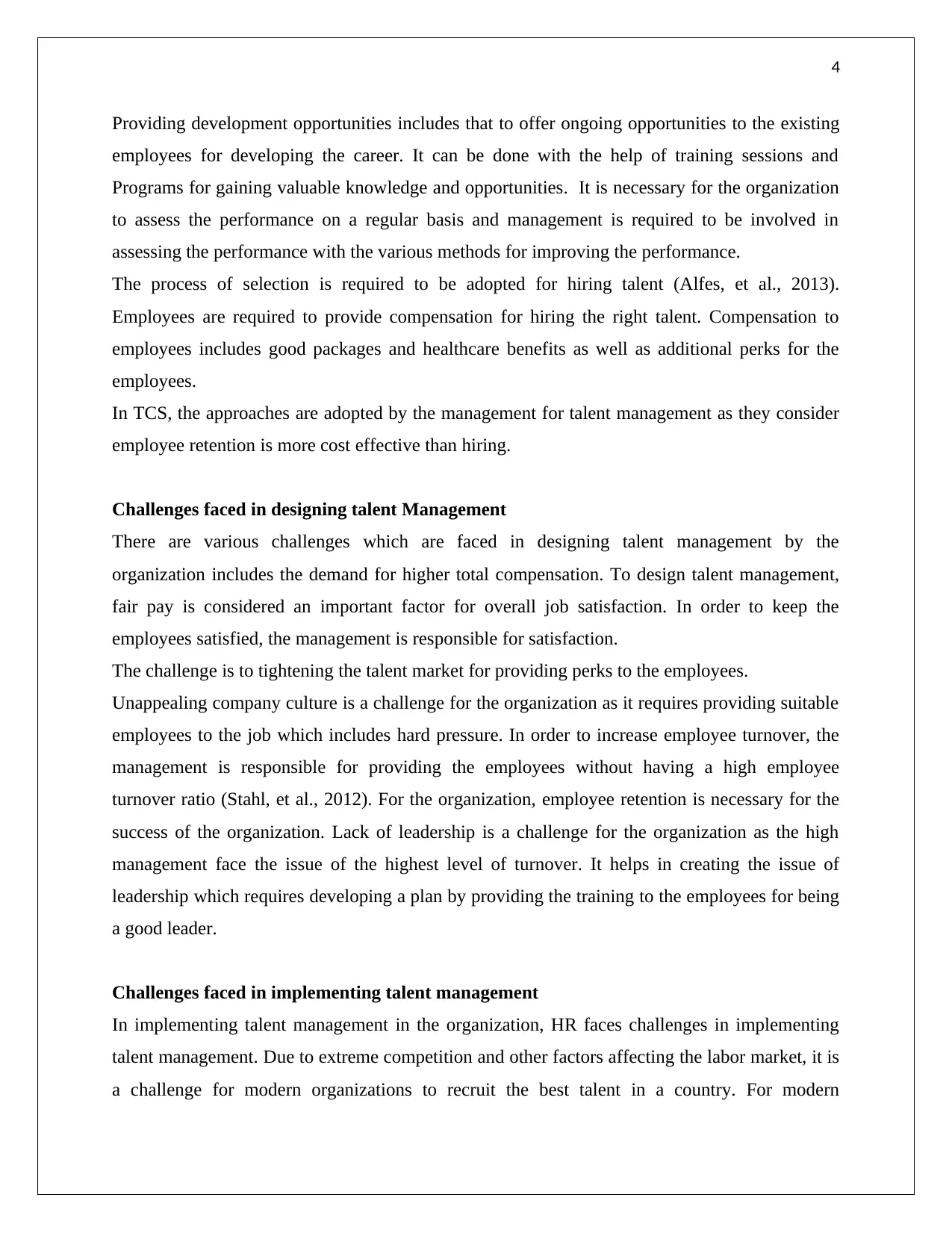
4
Providing development opportunities includes that to offer ongoing opportunities to the existing
employees for developing the career. It can be done with the help of training sessions and
Programs for gaining valuable knowledge and opportunities. It is necessary for the organization
to assess the performance on a regular basis and management is required to be involved in
assessing the performance with the various methods for improving the performance.
The process of selection is required to be adopted for hiring talent (Alfes, et al., 2013).
Employees are required to provide compensation for hiring the right talent. Compensation to
employees includes good packages and healthcare benefits as well as additional perks for the
employees.
In TCS, the approaches are adopted by the management for talent management as they consider
employee retention is more cost effective than hiring.
Challenges faced in designing talent Management
There are various challenges which are faced in designing talent management by the
organization includes the demand for higher total compensation. To design talent management,
fair pay is considered an important factor for overall job satisfaction. In order to keep the
employees satisfied, the management is responsible for satisfaction.
The challenge is to tightening the talent market for providing perks to the employees.
Unappealing company culture is a challenge for the organization as it requires providing suitable
employees to the job which includes hard pressure. In order to increase employee turnover, the
management is responsible for providing the employees without having a high employee
turnover ratio (Stahl, et al., 2012). For the organization, employee retention is necessary for the
success of the organization. Lack of leadership is a challenge for the organization as the high
management face the issue of the highest level of turnover. It helps in creating the issue of
leadership which requires developing a plan by providing the training to the employees for being
a good leader.
Challenges faced in implementing talent management
In implementing talent management in the organization, HR faces challenges in implementing
talent management. Due to extreme competition and other factors affecting the labor market, it is
a challenge for modern organizations to recruit the best talent in a country. For modern
Providing development opportunities includes that to offer ongoing opportunities to the existing
employees for developing the career. It can be done with the help of training sessions and
Programs for gaining valuable knowledge and opportunities. It is necessary for the organization
to assess the performance on a regular basis and management is required to be involved in
assessing the performance with the various methods for improving the performance.
The process of selection is required to be adopted for hiring talent (Alfes, et al., 2013).
Employees are required to provide compensation for hiring the right talent. Compensation to
employees includes good packages and healthcare benefits as well as additional perks for the
employees.
In TCS, the approaches are adopted by the management for talent management as they consider
employee retention is more cost effective than hiring.
Challenges faced in designing talent Management
There are various challenges which are faced in designing talent management by the
organization includes the demand for higher total compensation. To design talent management,
fair pay is considered an important factor for overall job satisfaction. In order to keep the
employees satisfied, the management is responsible for satisfaction.
The challenge is to tightening the talent market for providing perks to the employees.
Unappealing company culture is a challenge for the organization as it requires providing suitable
employees to the job which includes hard pressure. In order to increase employee turnover, the
management is responsible for providing the employees without having a high employee
turnover ratio (Stahl, et al., 2012). For the organization, employee retention is necessary for the
success of the organization. Lack of leadership is a challenge for the organization as the high
management face the issue of the highest level of turnover. It helps in creating the issue of
leadership which requires developing a plan by providing the training to the employees for being
a good leader.
Challenges faced in implementing talent management
In implementing talent management in the organization, HR faces challenges in implementing
talent management. Due to extreme competition and other factors affecting the labor market, it is
a challenge for modern organizations to recruit the best talent in a country. For modern
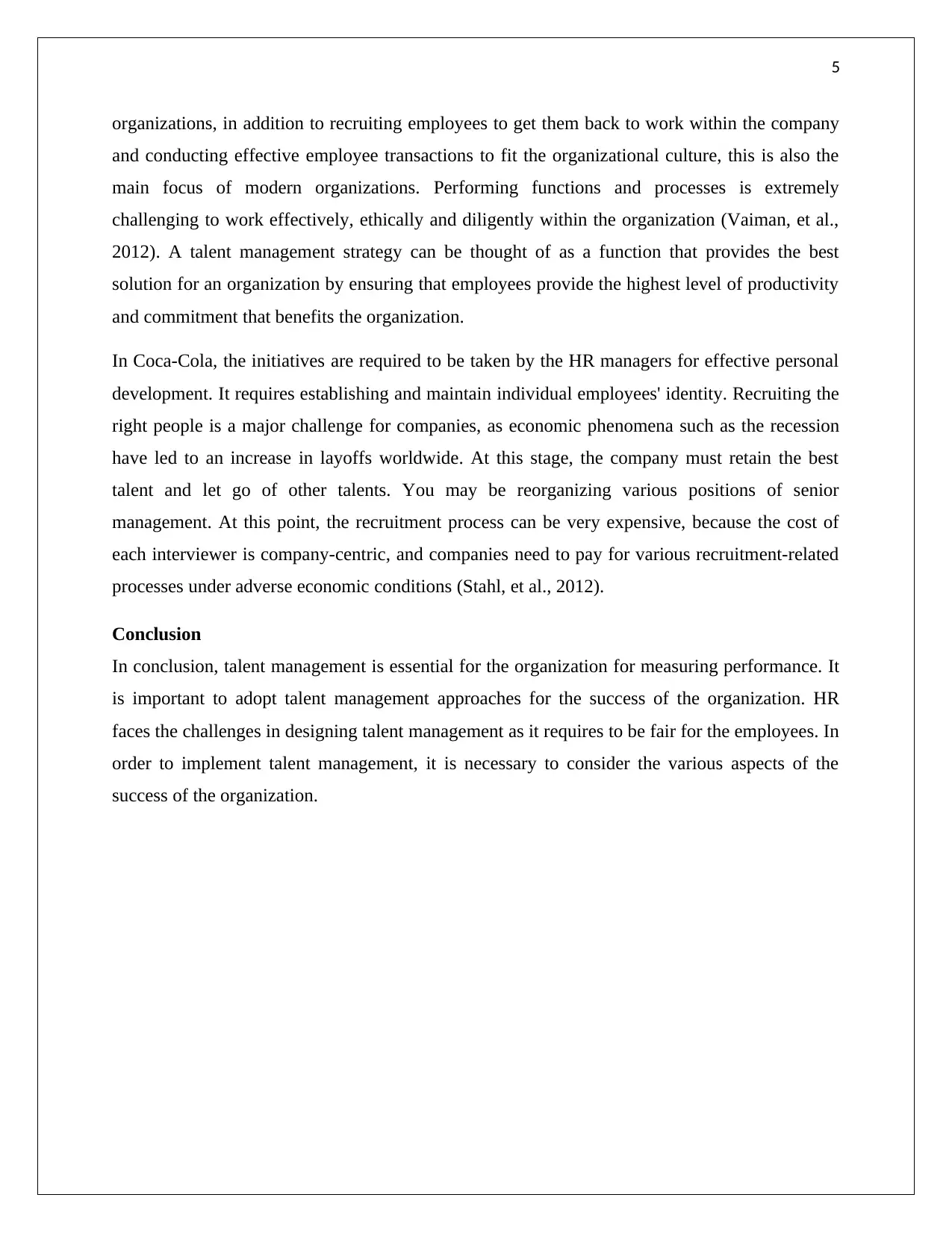
5
organizations, in addition to recruiting employees to get them back to work within the company
and conducting effective employee transactions to fit the organizational culture, this is also the
main focus of modern organizations. Performing functions and processes is extremely
challenging to work effectively, ethically and diligently within the organization (Vaiman, et al.,
2012). A talent management strategy can be thought of as a function that provides the best
solution for an organization by ensuring that employees provide the highest level of productivity
and commitment that benefits the organization.
In Coca-Cola, the initiatives are required to be taken by the HR managers for effective personal
development. It requires establishing and maintain individual employees' identity. Recruiting the
right people is a major challenge for companies, as economic phenomena such as the recession
have led to an increase in layoffs worldwide. At this stage, the company must retain the best
talent and let go of other talents. You may be reorganizing various positions of senior
management. At this point, the recruitment process can be very expensive, because the cost of
each interviewer is company-centric, and companies need to pay for various recruitment-related
processes under adverse economic conditions (Stahl, et al., 2012).
Conclusion
In conclusion, talent management is essential for the organization for measuring performance. It
is important to adopt talent management approaches for the success of the organization. HR
faces the challenges in designing talent management as it requires to be fair for the employees. In
order to implement talent management, it is necessary to consider the various aspects of the
success of the organization.
organizations, in addition to recruiting employees to get them back to work within the company
and conducting effective employee transactions to fit the organizational culture, this is also the
main focus of modern organizations. Performing functions and processes is extremely
challenging to work effectively, ethically and diligently within the organization (Vaiman, et al.,
2012). A talent management strategy can be thought of as a function that provides the best
solution for an organization by ensuring that employees provide the highest level of productivity
and commitment that benefits the organization.
In Coca-Cola, the initiatives are required to be taken by the HR managers for effective personal
development. It requires establishing and maintain individual employees' identity. Recruiting the
right people is a major challenge for companies, as economic phenomena such as the recession
have led to an increase in layoffs worldwide. At this stage, the company must retain the best
talent and let go of other talents. You may be reorganizing various positions of senior
management. At this point, the recruitment process can be very expensive, because the cost of
each interviewer is company-centric, and companies need to pay for various recruitment-related
processes under adverse economic conditions (Stahl, et al., 2012).
Conclusion
In conclusion, talent management is essential for the organization for measuring performance. It
is important to adopt talent management approaches for the success of the organization. HR
faces the challenges in designing talent management as it requires to be fair for the employees. In
order to implement talent management, it is necessary to consider the various aspects of the
success of the organization.
⊘ This is a preview!⊘
Do you want full access?
Subscribe today to unlock all pages.

Trusted by 1+ million students worldwide
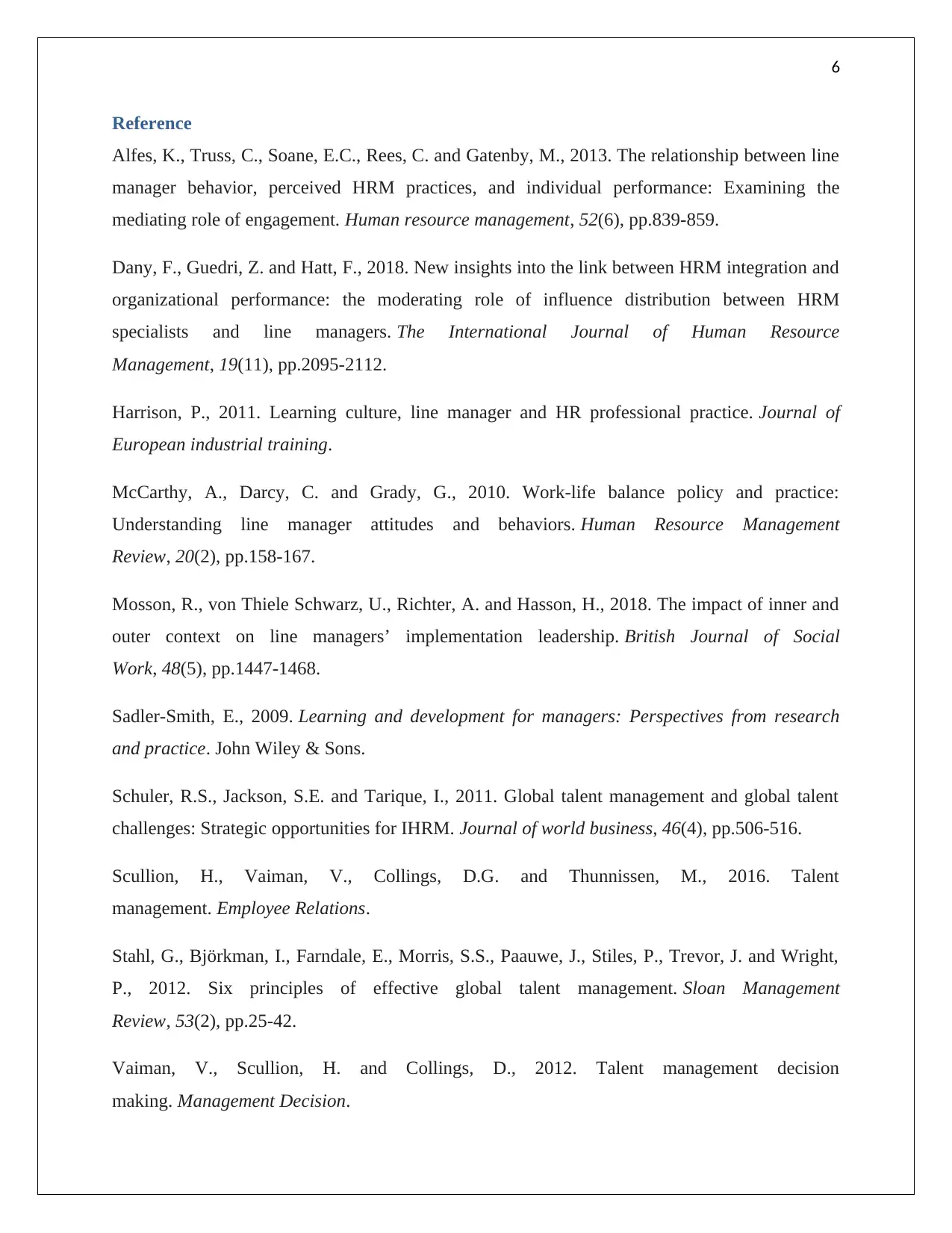
6
Reference
Alfes, K., Truss, C., Soane, E.C., Rees, C. and Gatenby, M., 2013. The relationship between line
manager behavior, perceived HRM practices, and individual performance: Examining the
mediating role of engagement. Human resource management, 52(6), pp.839-859.
Dany, F., Guedri, Z. and Hatt, F., 2018. New insights into the link between HRM integration and
organizational performance: the moderating role of influence distribution between HRM
specialists and line managers. The International Journal of Human Resource
Management, 19(11), pp.2095-2112.
Harrison, P., 2011. Learning culture, line manager and HR professional practice. Journal of
European industrial training.
McCarthy, A., Darcy, C. and Grady, G., 2010. Work-life balance policy and practice:
Understanding line manager attitudes and behaviors. Human Resource Management
Review, 20(2), pp.158-167.
Mosson, R., von Thiele Schwarz, U., Richter, A. and Hasson, H., 2018. The impact of inner and
outer context on line managers’ implementation leadership. British Journal of Social
Work, 48(5), pp.1447-1468.
Sadler-Smith, E., 2009. Learning and development for managers: Perspectives from research
and practice. John Wiley & Sons.
Schuler, R.S., Jackson, S.E. and Tarique, I., 2011. Global talent management and global talent
challenges: Strategic opportunities for IHRM. Journal of world business, 46(4), pp.506-516.
Scullion, H., Vaiman, V., Collings, D.G. and Thunnissen, M., 2016. Talent
management. Employee Relations.
Stahl, G., Björkman, I., Farndale, E., Morris, S.S., Paauwe, J., Stiles, P., Trevor, J. and Wright,
P., 2012. Six principles of effective global talent management. Sloan Management
Review, 53(2), pp.25-42.
Vaiman, V., Scullion, H. and Collings, D., 2012. Talent management decision
making. Management Decision.
Reference
Alfes, K., Truss, C., Soane, E.C., Rees, C. and Gatenby, M., 2013. The relationship between line
manager behavior, perceived HRM practices, and individual performance: Examining the
mediating role of engagement. Human resource management, 52(6), pp.839-859.
Dany, F., Guedri, Z. and Hatt, F., 2018. New insights into the link between HRM integration and
organizational performance: the moderating role of influence distribution between HRM
specialists and line managers. The International Journal of Human Resource
Management, 19(11), pp.2095-2112.
Harrison, P., 2011. Learning culture, line manager and HR professional practice. Journal of
European industrial training.
McCarthy, A., Darcy, C. and Grady, G., 2010. Work-life balance policy and practice:
Understanding line manager attitudes and behaviors. Human Resource Management
Review, 20(2), pp.158-167.
Mosson, R., von Thiele Schwarz, U., Richter, A. and Hasson, H., 2018. The impact of inner and
outer context on line managers’ implementation leadership. British Journal of Social
Work, 48(5), pp.1447-1468.
Sadler-Smith, E., 2009. Learning and development for managers: Perspectives from research
and practice. John Wiley & Sons.
Schuler, R.S., Jackson, S.E. and Tarique, I., 2011. Global talent management and global talent
challenges: Strategic opportunities for IHRM. Journal of world business, 46(4), pp.506-516.
Scullion, H., Vaiman, V., Collings, D.G. and Thunnissen, M., 2016. Talent
management. Employee Relations.
Stahl, G., Björkman, I., Farndale, E., Morris, S.S., Paauwe, J., Stiles, P., Trevor, J. and Wright,
P., 2012. Six principles of effective global talent management. Sloan Management
Review, 53(2), pp.25-42.
Vaiman, V., Scullion, H. and Collings, D., 2012. Talent management decision
making. Management Decision.
1 out of 7
Related Documents
Your All-in-One AI-Powered Toolkit for Academic Success.
+13062052269
info@desklib.com
Available 24*7 on WhatsApp / Email
![[object Object]](/_next/static/media/star-bottom.7253800d.svg)
Unlock your academic potential
Copyright © 2020–2026 A2Z Services. All Rights Reserved. Developed and managed by ZUCOL.





